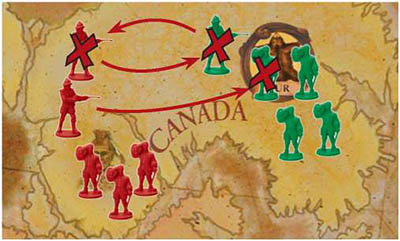
It is the late 15th century and a new age is dawning. While searching for a new trade route to India, European explorers have discovered a new land. The first reports tell of strange people, exotic creatures, and fabulous wealth. Captains and adventurers flock to these new lands in search of gold.
They are quickly followed by colonists, soldiers, merchants, and missionaries all seeking wealth of one kind or another. Colonies begin to spring up, and soon competition between the great nations of Europe begins.
Take the role of one of Europe's colonial powers and stake your claim in the New World. As the leader of your nation, there are many paths that lead to victory: Discover and colonize new lands; acquire trade goods and build your economy; develop new technologies and infrastructure in your home country; build your merchant fleet to dominate the trade routes; and build your army to defend what is rightfully yours!
The triumphant revel in riches and glory, while the vanquished become a footnote in the history books. It is an Age of Discovery, it is an Age of Empires!
Components
Game Board
The map of the North and South American continents on the left side of the board is separated into 9 regions. Each region has a trade good associated with it (for example Peru has silver). On the right side of the board are the event boxes. During the game, players place their colonists in these boxes to perform different actions.

Capital Buildings

Each capital building has an Age (I, II or III) noted on the back of the tile. This is the age during which the building is available. Capital buildings give the owner special bonuses (such as colonists, specialists, gold, or victory points).
Colonists
(30 of each color: red, yellow, green, blue, and orange). Colonists are the basic unit of the game. They are placed in the event boxes during the turn to claim the space and perform the action depicted in the event box.
Specialists
(Captain x 5 per color; Merchant x 5 per color, Missionary x 10 per color, Soldier x 10 per color) . Specialists can perform the same function as the basic colonists but also have unique extra abilities.

Merchant Ships
One ship is used as the Turn Marker and one is used to mark the unavailable spaces on the colonist dock. The other 8 units represent sea faring trade, and can be combined with Trade Goods to form "sets" that generate income.
Money


50 silver "Pieces of Eight" coins (each silver coin has a value = 1 Spanish Dollar) , 40 gold "doubloon" coins (each gold coin has a value = 10 Spanish Dollars)
Trade Goods

(gold x 5, silver x 6, cattle x 3, cocoa x 3, fish x 3, sugar x 6, fur x 4, coffee x 4, tobacco x 5, rice x 3, indigo x 4). These are used to represent the trade conducted by each Colonial Empire. The number on the counter shows the quantity of each trade good in the game.
Discovery Counter

(16 cardboard counters) These are used to determine the danger and reward for discovering each region.
Discovery Deck

(16 cards) These are used after all of the regions on the board have been discovered. They represent discoveries beyond the early colonies.
Setup
Players: Each player chooses a color and places the pieces in that color near them (the "unused supply" of pieces). Each player gets 10 Spanish Dollars (10 silver coins or 1 gold coin) and five basic colonists to start. One extra colonist from each player is placed (in random order) in the "Turn Order" Area at the beginning of the game.
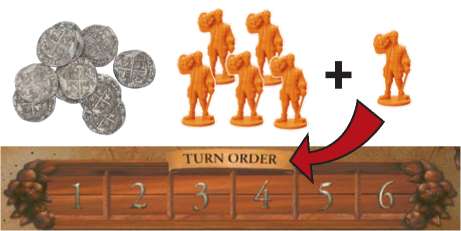
The Board: In each Region (except the Caribbean) place one random discovery counter face down. The Caribbean Region is available for colonization from the beginning of the game, and so does not need a discovery counter. In addition, place one trade good face up in each region.
The trade good for each region is identified on the game board; for example Peru will have one silver trade good placed in its region at the start of every game.
Capital Buildings: Separate the capital buildings into the three ages (as noted by the icons I, II, and III on the back of the capital building tiles) and place them face down in three piles (one pile per age). Randomly draw five Age I capital buildings and place them face up at the top of the board.
Trade Goods: Place the remaining trade goods face down near the gameboard and mix them together. Randomly draw four trade goods from the pile of unselected trade good counters and place them face up beside the Trade Goods event box on the board.
Merchant Ship: Place a Merchant Ship in the Merchant Shipping Box.
Colonist Dock: There is only a limited number of Colonist Dock spaces that are available during the game. (The number of available spaces is equal to two times the number of players minus one (2xPlayers-1)).
Place a Merchant Ship on the first unused space of the colonist dock to show which spaces are not available. For example in a 5 player game, 9 spaces would be available, so the 10, 11 and 12 spaces would be blocked off. The X and Y spaces are left open and are available only to the player that owns the related special capital building.
Initial Starting Order: One Colonist piece for each player color is placed in random order to determine the turn order for the start of the game. The player who is 1st gets no extra money, however, the 2nd player gets $1 extra (in addition to the $10 that she started with), the 3rd player gets an extra $2, the 4th player gets an extra $3, and so on.
Game Play
The Age of Discovery is a game for 2 to 5 players in which the players control the destiny of one of the major colonizing powers after Columbus' discovery of the new world.
Each nation will attempt to discover and explore new regions in the new world, to colonize and dominate these regions, to build their colonial economies and trade routes, and to use the new wealth to create a new age of prosperity in their home country.
The nations are:
- Red: England
- Blue: France
- Yellow: Spain
- Green: Portugal
- Orange: Holland
During the game, players will take turns placing their colonists and/or specialists in the Event Boxes. Once all players have placed all of their colonists and specialists, the Event Boxes will be executed one at a time from top to bottom.
When an Event Box is executed, each colonist or specialist on a space in an Event Box performs the appropriate action for that box.
Historical Note: This placement and execution represents the allocation of a nation's people and resources, and the formulation of a colonial strategy.
Turn Phases
There are 8 turns in the game. Turns 1-3 are Age I, Turns 4 - 6 are Age II, and Turns 7 - 8 are Age III.
During each turn, the players will execute the following:
A. Colonist/ Specialist Placement
In turn order (the order shown in the Turn Order box), players place one of their available colonists or specialists in any of the event boxes on the right side of the board.
-
Initiative, Colonist Dock, Capital Buildings and Warfare Event Boxes: Colonists and specialists must be placed from left to right, filling in from the first available slot on the left.
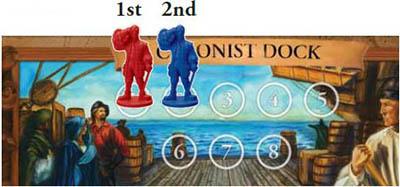
-
Merchant Shipping and Discovery Event Boxes: Place colonists anywhere within this area.
-
Specialist Event Box: Place a colonist in the slot of the particular specialist desired. A total of 5 specialists are available each turn (there is 1 of each specialist available plus, if a player wishes, he/she can pay five gold to train one specialist of any kind).
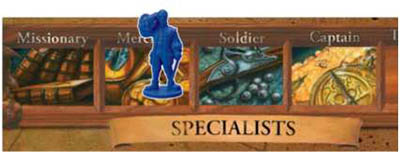
The player has chosen to place the colonist in the Merchant Space and will get an extra Merchant for use in the next turn.
Colonists and specialists are placed in this manner until all players have none remaining. Players may not save colonists or specialists for the next round.
Note: Some players may have more colonists and specialists than others due to Capital Buildings and specialists acquired from the specialist box in the previous turn. These extra colonists are played in player turn order along with the starting five colonists until there are none remaining.
B. Resolution
Each event box is resolved one at a time from top to bottom ( Initiative first, Colonist Dock second, Trade Goods third, then Merchant Shipping, Capital Building, Discovery, Specialist and finally Warfare according to the special rules for each box (see Event Boxes below).
After each of the Trade Goods, Merchant Shipping, Capital Building, Specialist and Warfare boxes have been resolved, remove all the colonists and specialists from these boxes and return them to the owning players unused supply.
Exception: Colonists and specialists are not removed from the Discovery box except when sent on expeditions of discovery.
After all of the event boxes have been resolved, players receive the following benefits:
C. Income
All Income from Trade Goods/ Merchant Ships is collected by the players.
D. Capital Building Benefits
All recurring benefits (those that are generated each turn) from Capital Buildings are taken by the owning players.
The turn is completed with the following:
E. Refresh Capital Buildings
Refresh the number of capital buildings (drawing them randomly from the correct stack of face down counters and placing them face up on the board) so that there are five capital buildings available for purchase at the beginning of each turn.
In Age I (turns 1-3) only Age I buildings are available for purchase. At the end of Turn 3, Age I ends. Remove all unpurchased Age I capital buildings from play and place five Age II capital buildings (again drawn at random) on the board face up.
At the end of Turn 6, Age II ends. Remove all unpurchased Age II capital buildings from play and place five Age III capital buildings (once again drawn at random) on the board face up. If all buildings available for an age have been purchased no additional buildings are put out.
Capital buildings that are purchased are kept in front of the purchasing player throughout the game even if they are a one time use building (for example New World Cartography).
Note: Purchased capital buildings that convey benefits each turn will convey their benefits throughout the game. For example a purchased Age I building that generates an additional colonist (Settlers) continues to do so in Age II and Age III.

Example: At the end of Turn 2, there are three remaining Capital Buildings.
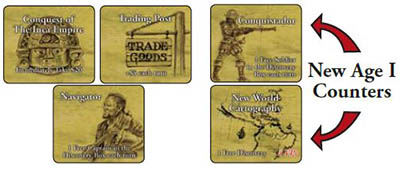
At the beginning of Turn 3, two new Age I Capital Buildings are chosen at random and are placed with the three remaining from Turn 2.
F. Refresh Trade Goods
Place 4 randomly selected trade goods face up beside the trade good box on the board. Leftover trade goods from the previous turn (if any) are mixed back into the pile of unselected trade goods prior to selecting 4 from the available trade goods.
G. Refresh Merchant Ship
Place a new Merchant Ship in the Merchant Shipping box. (Note: This is only done if the box is empty. There can never be two Merchant Ships in the Merchant Shipping Box).
H. Take Starting Colonists
All players take five free colonists (in their color) from the unused supply and place them in front of them. These are added to any specialists or colonists received from Capital Buildings or from the Specialist Event Box.
Example: At the end of the turn, the Red player gets 5 free Colonists, one Missionary ( the Red player owns the 'Monastery' Capital Building), and one Captain (the Red player had a Colonist in the Captain Box in the Specialist track).
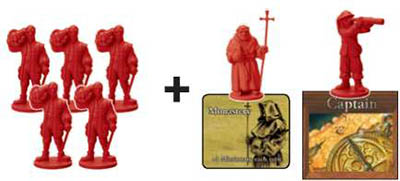
I. New Turn Order
Move the colonists in the Initiative box up into the corresponding slots in the Turn Order box. Any player who did not place a colonist in the Initiative box has their colonist moved back in the Turn Order box behind those who did.
If more than one player did not put a colonist in the Initiative box, their colonists are placed in the positions in the Turn Order box after those who did have colonists in the Initiative box and in the same order from the previous turn relative to each other.
Example: On turn 2, the player order was Red, Blue, Green, and Orange.

During turn 2, the Green player placed a colonist in the Initiative box in slot "1", and the Orange player placed a colonist in slot "2".

The new turn order for turn 3 would be Green, Orange, Red, Blue (Red and Blue having been moved to the back of the order, but retaining their relative position).

Note: All resources (gold, colonists, specialists, trade goods, merchant ships, capital buildings) are public knowledge (all players must be able to see what the other players have). These resources cannot be traded or shared.
J. Advance The Turn Marker
Move the Turn Marker forward one turn.
Specialists
During the Age of Discovery, colonists with special skills were particularly valuable. Each specialist acts as a colonist but also has unique abilities.
Captain

Captains represent the heroic individuals who led great expeditions of exploration and trade.It was through the expertise and efforts of these extraordinary men that a new age was created.
The Captain counts as two colonists in the Merchant Shipping event box or the Discovery event box. Example: If a player had two captains and one colonist in Merchant Shipping, this would be the same as if that player had five colonists there.
Merchant

With a vast amount of untapped resources and new commodities, The New World was full of wealth and business opportunities. Merchants represent individuals with a talent for business ventures, whether it be a sugar plantation, a silver mine, a cattle ranch, or a trading post in a far off land.
A Merchant has two possible uses: 1) He counts as two colonists in the Merchant Shipping event box. 2) If placed in the Colonist Dock event box, he generates a one-time income when he arrives in the New World.
He generates five Spanish Dollars ($5) for the owning player upon arrival in a New World colony. (Note: this happens only when the merchant arrives, not every turn). The dollars generated by a Merchant arriving in the New World are paid immediately upon arrival, not during the income phase.
Missionary

To Christian Europe, the New World represented a new frontier for 'saving souls' and for spreading its religion's influence in the world. Missionaries accompanied most expeditions of discovery, conquest, and colonization, converting the native peoples of the New World so that they could be incorporated into the new European order.
When a Missionary arrives in the New World via the Colonist Dock event box he generates an additional colonist for the owning player within the colony in which he is placed.
Soldier

European military technology (guns, horses, ships, and steel) allowed soldiers to plunder and conquer native cultures in their quest for instant wealth and glory. However, once colonies had been established, soldiers also became necessary to protect their nation's claim to the new land.
A Soldier Has Two Possible Uses:
1) He generates one-time income for the owning player when he is part of a successful discovery expedition (launched from the Discovery event box).
The amount in Spanish Dollars plundered by each soldier in the expedition is displayed on the discovery counter.
Note: After soldiers generate this money, they are removed from board and placed in the player's supply. They do not stay in the colony.
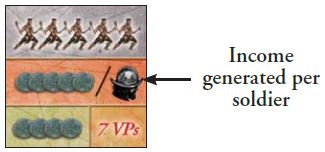
2) When soldiers are sent to the New World (via the colonist dock) they are placed in a colony and may be used to eliminate other player's colonists/specialists in that colony.
Event Boxes
Turn Order
Each player has a colonist in one of the numbered slots. Turn order determines the order in which players place their colonists and specialists (Slot 1 = 1st, slot 2 = 2nd, etc)..
It also determines the winner in the Merchant Shipping area in the event that two or more players have the same value in colonists and/ or specialists there (tie breaker). The turn order also determines the order in which players attempt to make discoveries.
Each Turn Order box is divided by a line in the middle. This allows players to move their piece above or below the line during the colonist/specialist placement phase to indicate that they have acted. This indicator is a good visual cue for the players to easily see whose turn it is to act.
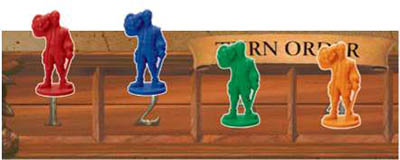
Initiative
The Initiative box serves two functions: 1) It provides income for any player who has placed a colonist there, and 2) It determines the Turn Order for the following turn.
When resolved, each player with a colonist in a slot in the Initiative box receives income equal to the number in that slot: 1 Spanish Dollar ($1) for slot "1", $2 for slot "2", etc.
Note: Income generated by the Initiative box is received immediately when this box is resolved (the first event box resolved).
At the end of the Resolution phase, move the Initiative box lineup up into the Turn Order box and remove the pieces that were in the Turn Order box. (This is discussed in detail in Section III). New Turn Order).
Note: Players may place no more than one colonist in the initiative box. Players who do not place a colonist in the Initiative box DO NOT receive income from the Initiative phase.
Colonist Dock
When resolved, the colonists placed on the Colonist Dock are moved in order ("1" first, "2" second, and so on) to a discovered region in the New World (one that has had its discovery counter removed). The owning player may decide which discovered region the colonist or specialist is placed. Once placed, colonists may not be moved (unless allowed by a capital building).
The first player to have three of their colonists in a region gets the trade good in that region. Once this occurs, the region is now eligible for victory point scoring, and remains so unless the population of the colony is reduced to less than three. The X and Y spaces are only available to the player(s) who own the related Capital Buildings and are resolved in order after all available numbered slots.
Note: With the exception of soldiers, once a specialist arrives in the New World he no longer conveys any benefits. Specialists are not designed to be a limited commodity so if a player wishes, the specialists in the New World can be swapped out for colonists and the specialists returned to the player's reserve pool (this has no effect on gameplay).
Trade Goods

When resolved, players with colonists in these spaces choose a trade good from the pool of four that were placed at the beginning of the turn. The player with a colonist in space "1" chooses first and so on. Acquired trade goods are placed face up in front of the owning player.
Note: Trade goods stay with the player the whole game (they are not turned in when they generate income).
Merchant Shipping
When resolved, the player with the highest value in colonists and specialists in this area gains one Merchant Ship (from the Merchant Shipping event box). In the event of a tie, the player earliest in the turn order wins. Colonists in this event box have a value of "1", and Captains and Merchants have a value of "2".
Capital Building
When resolved, the players with colonists in this area take turns (left to right), paying the correct price in Spanish Dollars depending on the Age ($10 in Age I, $14 in Age II and $20 in Age III), and choosing a Capital Building from those available. Players may choose not to purchase a capital building even though they have a colonist in the Capital Building box.
There is no penalty or cost associated with not doing so. Capital buildings that say "immediately" convey their benefits the moment they are purchased.
Discovery
When resolved, players (in turn order) may send their colonists and specialists in the Discovery box on an "Expedition of Discovery". When this occurs, the player announces how many of his colonists in the Discovery Box will go on the expedition, then chooses a particular region that has not yet been discovered, and turns over the discovery counter in that region for all to see.
If the value of the player's colonists and specialists (including soldiers) sent on the expedition is equal to or greater than the number of Native American icons on discovery counter, then the expedition succeeds. In this case, the discovering player gets a free colonist (not a specialist) in the newly discovered region, gains the Spanish Dollars equal to the coins shown on the discovery counter and any bonus dollars earned from soldiers sent on the discovery, (The discovery counter is placed in front of the player so that the Victory Points may be tallied at the end of the game).
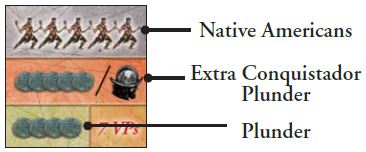
If the expedition value is less than the number on the discovery counter, then it fails. The discovery counter is returned to the region face down. In either case, the player's colonists and specialists that were part of the expedition are removed from the board and returned to the player's unused supply.
Note: Until an expedition is launched, the colonists placed in the Discovery box remain there. This is unlike all other areas, which are cleared off at the end of each turn.
Once all regions in the New World have been discovered, the Discovery Card Deck is used. From that point onward, whenever a player launches an expedition of discovery, he or she draws the top card from the deck.
A successful Discovery Deck expedition rewards the player in exactly the same manner as the discovery counter with the following exception: The Discovery Deck consists of specific geographic locations (The Mississippi) or regions not on the game board (China); therefore no colonists are placed on the board as a result of a successful Discovery Deck expedition.
The successfully discovered card is placed in front of the player in the same manner as the discovery counters. When a Discovery Card Deck expedition is unsuccessful, the card is shuffled back into the deck (the area is still undiscovered and therefore still available to a player who sends an adequate expedition).
Note: Players must discover all regions in the New World before attempting expeditions in the Discovery Deck.
Note: Players may only launch one discovery per turn but are not required to send all of their colonists on an expedition. The colonists that remain behind stay in the Discovery Area and can be used for future expeditions.
Specialists

When resolved, players receive the specialist shown in the box occupied by their colonist. A player who has chosen the training box can pay five gold and pick any one specialist. Only one player can occupy a specialist box at a time and only one specialist can be "trained" per turn for a maximum of five specialists available per turn. Specialists taken in this phase are placed in front of the owning player for use on the next turn.
Warfare
When a player places a colonist in the Warfare Box he is preparing for war. When the war phase is resolved, the player must decide whether it will merely be a single Battle or a full- scale War. A player may declare multiple Battles and/or full-scale Wars by placing additional units in the Warfare Box (1 conflict per unit).
Note: There is no special benefit for a player who places a soldier in the Warfare box.
If a single Battle is declared, the declaring player chooses a single region and a single player to fight against in that region. A single battle has no cost in Dollars ($0).
If a player declares a full-scale War he or she chooses a single opponent. There are battles in ALL colonies where both players have at least one colonist or specialist and at least one of these is a soldier. The player declaring a full-scale war must pay $10. In each battle, each soldier eliminates one enemy unit (colonist or specialist). The owner of the soldier may choose which enemy unit is eliminated by their soldier. All casualties occur simultaneously with the units being removed AFTER all casualties are determined. (units can be knocked over to indicate elimination before they are removed).
Note: Players not involved in the battle or war may not lend soldiers or be attacked.
Battle Example
During his turn Sean placed a colonist in the Warfare box. Sean has two soldiers and three colonists in Canada. He declares a battle against Angelo in Canada where Angelo has one soldier and four colonists. Sean has two soldiers and may therefore eliminate two of Sean's units. He chooses to eliminate Angelo's soldier and a colonist. Angelo chooses to eliminate one of Sean's soldiers.
War Example
During his turn Sean placed a colonist in the Warfare box. When the Warfare box is resolved, Sean declares war on Angelo and pays $10. Sean has soldiers and colonists in New Granada, New Spain and New England and only colonists in Florida and Canada. Angelo has colonists in New Granada, Canada, and New Spain and he also has soldiers in Florida.
Battles occur in New Granada, New Spain, and Florida. No battle occurs in Canada. Although both players have colonists in Canada, neither of them have a soldier there.
Trade Goods/merchant Ships
Trade goods represent the economies and trade of each Colonial Empire. The number on each counter shows how many of each trade good there is in the game, and has no other function (i.e. It is not a "value" of the trade good). This information is provided so that players can plan appropriately.
Trade Goods are acquired by players in one of three ways: 1) By being the first to have three colonists in a region, a player gains the Trade Good counter in that region, or 2) by placing a colonist in the Trade Goods area and selecting a trade good from those available. 3) The Capital Building "The West Indies Company", allows the owning player to gain a free random trade good each turn.
Once acquired, trade goods remain with that player throughout the game and generate income for the owning player at the end of each turn. The amount of the income (in Spanish dollars) is determined by how many and what kind of "sets" are created. Players create "sets" by placing their trade goods counters into groups of three or four. Each counter may only be used in one set.
Note: Each turn, the trade goods and Merchant ships may be rearranged to form new sets.
Any Three Trade Goods = $1 (1 Spanish Dollar) (example: Indigo, Silver, Tobacco)

Three of the Same Kind = $3 (example: Indigo, Indigo, Merchant Ship)
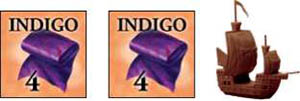
Four of the Same Kind = $6 (example: Sugar, Sugar, Sugar, Sugar)

Merchant ships act as "wild cards" in making sets. In other words, a merchant ship can be treated as any type of trade good for the purpose of completing a set. Only one Merchant Ship can be used per set.
Note: The sets are not cashed in, but rather generate income at the end of each turn.
At the end of the game, players earn victory points equal to the amount of gold that they earn from their trade goods and merchant ships.
Note: This is the amount of gold they earn from trade goods and merchant ships on turn 8 only, not throughout the game.
Capital Buildings
Capital Buildings are purchased by the player with Spanish Dollars and confer a benefit as stated on the Capital Building Counter. Some benefits are one-time and immediate, and others (such as buildings that generate income and specialists) occur every turn. (see Appendix II for a complete description and rules for each Capital Building).
The cost of Capital Buildings increases with each new age: Each Capital Building purchased costs $10 in Age I, $14 in Age II, and $20 in Age III.
For a description of how Capital Buildings are introduced into the game, see Section III Part A: Gameplay - Capital Buildings.
End of the Game

Victory points are earned three times during the game. New World colonies score victory points at the end of Age I (end of turn 3), Age II (end of turn 6) and Age III (end of turn 8, the end of the game)..
Each Player's Victory Points should be kept track of on paper.
New World Colony Scoring
At least one player must have three or more colonists or specialists in a colony for that colony to be scored. The player with the most colonists (including specialists) in a colony receives six points and the player with the second most colonists (once again including specialists) receives two points.
If there is a two-way tie for first each player receives two points (and no second place VP's are awarded).
If there is a three-way tie for first, all players receive zero points.
If there is a two-way tie (or more) for second place, those players receive zero points.
If only one player is in a region and has three or more colonists, that player scores six points (for first place), and no one gets the two points for second.
End-game Scoring
The game ends at the end of Turn 8. When the game ends, each player tallies his or her victory points (see below) and the player with the most accumulated victory points wins. Victory Points are awarded for:
Discoveries: The red number on the discovery counter or discovery card. The cards and counters owned by a player are scored at the end of the game only.
Colonies: Colonies are scored in the manner described above.
Capital Buildings: Some Capital Buildings are worth Victory Points for their owner. These are either a number in red or points for an accomplishment. (For example the capital building "Navy" grants 3 VPs per Merchant Ship owned by the player with the "Navy" capital building).
Economy: Players receive victory points equal to the amount of Spanish Dollars that their trade goods and merchant ships generated at the end of turn 8.
Ties
If two or more players end the game with the same number of victory points, ties are broken in the following manner: First tiebreaker: The player who gained the most victory points from New World colonies on turn 8. Second tiebreaker (if needed): the player with the most gold. Third tiebreaker (if needed): the player with the most trade goods.

Alternate Starting Order Rules
Rather than having the turn order at the beginning of the game determined randomly, an auction is held.
Each player (starting with the youngest), bids (in Spanish Dollars) in turn, clockwise around the table. Each bid must be higher than the previous bid or the player may "pass". The first player to pass places a colonist of his color in the last available turn space (the last available space is equal to the number of players in the game) in the Turn Order box.
The next player to pass places her colonist in the next lowest available space (for example in a five player game, the first player to pass places his colonist in the "5" space and the next player to pass places her colonist in the "4" space).
The player who places his colonist in the "2" spot pays half of his last bid (rounded up)(Example: If the last bid was $7, then they would pay $4). The player who takes the "2" spot also gets a free specialist of their choice if they bid $8 or more. The player who wins the bid places his colonist in the "1" spot, pays his entire last bid, and discovers the Caribbean region.
For discovering the Caribbean, the player receives the Spanish Dollars shown on the discovery counter (since no soldiers were involved in the expedition there is no soldier plundering bonus for this discovery) and places the discovery counter face up in front of himself (all future discovery counters are placed face up in front of the discovering player as well so that they can keep track of the Victory Points).
The discovering player places one colonist (not a specialist) in the Caribbean. This colonist does NOT count as one of the five starting colonists.
Continue Reading
